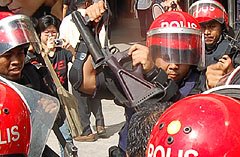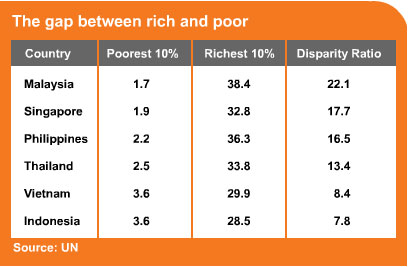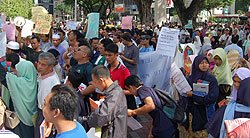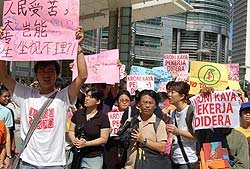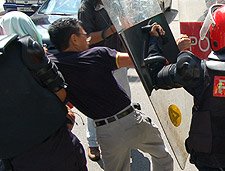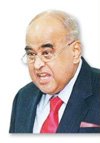Draft of Household Service Act, Workers Version
Translated by : The Columban JPIC Office
(This is now a Bill before the Taiwan Parliament)
Articles
Chapter I General Provisions
Article 1 : This Act is made especially for regulating the standards of minimum labor condition to protect a household worker’s right. Matter not herein regulated in this Act shall be applied to regulation stipulated in other laws.
Article 2 : The term used in this Act are defined as following :
1. Worker : This refers to a person, including a domestic helper and care taker, employed by an employer to engage in household works to gain his/her wage
2. Employer : This refers to the family that exercise the managing rights, including the employer that employs a worker, the family members and delegate of the employer, and the person that is given care.
3. Wages : This refers to the monetary gain obtained hrough working, including wages and premiums, allowances and any other regular payments paid in cash on an hourly, daily, monthly, or piece-work basis.
4. Labor contract : This refers to a contract that regulates an employer-employee relationship.
Article 3 : The competent authorities mentioned in this Act refer to the Council of Labor Affairs of the Executive Yuan in the central government ; the municipal governments in the municipal cities ; and the county (city) government in the counties and cities.
Article 4 : Any person shall not intervene in other person’s labor contract to extract illegal benefits.
Article 5 : An employer shall provide a worker with a habitable space equipped with
basic facilities, and the enforcement rules of this Article shall be stipulated by the competent authority. In case both parties agree, a worker’s residence can be settled outside of an employer’s, only that the worker’s rent and traveling allowance shall be paid by the employer in addition to the wage. An employer shall provide a worker with a household service standard, and while applying for a recruiting permit, this standard shall be reported to the competent authority, after which it shall take effect. The content of this standard shall not contravene the laws, public order, good customs, and shall also meet the proportion principle. An employer, during the subsisting period of the contract, shall provide a worker with food or food allowance.
Article 6 ; The central health competent authority, pursuant to regulation of The Labor Safety and Health Law and The Employment and Service Act, shall take the initiative to notice both the employer and worker to assist the latter to participate in regular medical checkup. The expense of this said medical checkup shall be shouldered by an employer.
Article 7 : An employer shall provide a worker with health insurance and labor insurance to protect the working rights of a worker.
Chapter II Labor Contract
Article 8 : Labor contracts are divided into fixed term contracts and non-fixed term contracts. An expired fixed term contract shall be viewed as non-fixed term contract in case any of the following situations arises :
1. Where a worker continues his work without any immediate expression of opposition from an employer.
2. Where albeit a new contract has already been made, only that the working period for both the old and new contract lasts for more than ninety days, and the discontinuance period in between the old and new contracts lasts less than thirty days.
Article 9 : Unless any of the following situations arises, an employer shall not terminate a labor contract with advance notice:
1. Where a worker contravenes with material nature the household service standard regulations of the labor contract, and the situation fails to be improved after asked by an employer to do so.
2. Where a worker is proven by the hospital to be suffering from or afflicted with other material disease or injury .
3. Where the person to be given care dies or the reasons for employment disappear.
4. Where force majeure necessitates business suspension for more than one month.
5. Where a worker is confirmed to be incompetent for his/her job duties. An employer terminates the contract pursuant to this preceding regulation, from the date that such circumstance is made known, shall act within thirty days. In case the worker is foreign person, return airfare shall be shouldered by the employer.
Article 10 : In case a worker is proven to be in any of the following situations, an employer is entitled to terminate the labor contract without advance notice:
1. Where a determinate sentence is pronounced and confirmed without probation notification or without permission to change this sentence into financial penalty.
2. Where [a worker] is absent justifiable reasons for three consecutive days.
3. Where violence or conduct of gross insult is done to an employer. An employer that terminates the contract pursuant to the preceding regulation, starting from the date that such circumstance is made known, shall act within 30 days. In the cased of a foreign person, the return airfare shall be shouldered by this person him/herself.
Article 11 : In case an employer is proven to be in any of the following situations, and one month after a worker raising an objection still fails to improve what shall be duly improved, than a worker is entitled to terminate the contract and ask the competent authority to have him/her transferred to another employer.
1. Where an employer does not pay wage to a worker in accordance with the contract.
2. Where an employer does not pay wage to a worker directly and in full amount.
3. Where an employer forcibly keeps a worker’s personal belongings in custody.
For a contract terminated pursuant to the preceding regulation, in case a worker is a foreign person who, instead of choosing to be transferred to another employer, desires to return to his/her own country, then this worker’s return airfare shall be shouldered by the employer.
Article 12 : In case any of the following situations arises, a worker is entitled to terminate the contract without advance notice, and the original employer shall present a contract-discharging agreement :
1. Where an employer asks a worker to engage in works unspecified in the employment permit regulations.
2. Where an employer renders violence, sexual assault, sexual harassment, or conducts of material insult against a worker.
3. Where an employer suffers from a malignant, infectious disease with contagious contingency.
4. Where an employer exerts act of violence and coercion or other illegal means to force a worker to engage in manual work.
5. Where an employer, through verbal intimidation or physical violence, forces a worker to sign any side-contract against his/her will.
6. Where an employer contravenes the labor contract or labor law, so that a worker’s rights might be compromised by certain damaging contingencies.
An employer that terminates a contract pursuant to Article 9 shall give notice to a worker one month in advance, or such notice shall be substituted by one-month wage. In case that both parties agree upon an advanced contract termination, both parties shall attend the local competent authority to sign an agreement of contract discharging in both parties’ mother tongues, only after which will the termination begin to take effect.
Article 14 : In case any of the following situations arises, a worker shall not ask separation fee from his/her employer.
1. Where terminates a labor contract pursuant to the regulation of Article 10.
2. Where a fixed-term labor contract expires and the worker has already left the post.
The separation fee shall be given in accordance with the following way of computation :
1. Where [a worker] continue[s] to work for the same employer, for each one-month average wage.
2. Where in respect of the odd service months or a service period less than one year, as is computed pursuant to the preceding paragraph, the separation fee shall be computed proportionately. A service period less than one month shall be computed as one month.
Article 15 : In case a migrant worker desires to be transferred to another employer pursuant to Article 11, during the period of time [waiting] for his/her transfer the competent authority shall pay unemployment allowance to the worker in accordance with The Employment Insurance Law.
Chapter III Wage
Article 16 : Wage shall be determined by an agreement between the worker and employer, provided that after deducted for food and lodging and travel allowance, this wage shall not fall below the basic wage regulated by The Labor Standards Law.
Article 17 : Wage shall be paid once on a regular monthly basis. An employer shall pay the wage in full amount, and shall not deduct any food and lodging fee further. An employer shall provide a worker with pay slips written in language(s) known to the worker, clearly in the slip the amounts of the wage, legal deductions such as tax, health insurance fee and labor insurance fee. After both the worker and the employer have confirmed the specific items, both parties shall sign on the slip, and each shall hold one copy of it. An employer shall keep a payroll of workers, specifying the amount of wages payable, the computed items of wage, and the sum total of wage payments. The payroll record shall be kept in custody for five years.
Article 18 : Where an employer asks a worker to extend his/her working hours(s), the wage for such extended hours(s) shall be paid plus an overtime pay more than half of his/her regular hourly wage.
Article 19 : An employer shall not deduct in advance a worker’s wage for punitive damages indemnity.
Article 20 : In case an employer is proven to be in arrear of wage payment, the competent authority shall order the employer to pay such arrear within a limited period o f time; in case such arrear is still unpaid by the expiry of the said, a worker is entitled to apply for the arrear payment pursuant to The Measures For Obtaining and Paying the Overdue Wages Repayment Fund and the Management of Repayment.
Chapter IV Work Time, Rest Time, and Day-Off
Article 22 : The regular work hours of a worker shall not exceed eight hours per day, and his/her work hours shall be determined by an agreement between the worker and employer. A worker shall rest for 10 consecutive hours per day. An employer shall not ask the worker to provide any manual work during his/her rest hours; in case there is an urgent need for the employer, the employer can only ask the worker to do so with the consent of the worker him/herself. The manual work provided by the worker during his/her rest hours shall be viewed as overtime, which shall not exceed two hours per day, ten hours per week, and forty hours per month.
The employer shall prepare the workers’ sign-in books or time cards to record a workers’ attendance on a day-to-day basis. These books and cards shall be kept in custody for one year.
Article 23 : A worker shall at least have one regular day-off every seven days. By principle this regular day-off shall be on Sundays.
Article 24 : An employer shall provide a worker with an eight-hour leave for labor education.
Article 25 : In case a worker continues to work for the same employer or business entity for a certain period of time, he/she shall be granted a special leave on an annual basis in accordance with the following scale :
1. Seven days for the service more than one year but less than three.
2. Ten days for the service more than three years but less than five.
3. Fourteen days for service more than five years but less than ten.
Article 26 : Memorial days, Labor Day, and other days stipulated by the central competent authority as holidays, these are national holidays for all workers to take day-off. The national holidays are as following :
1. New Year ( January 1st )
2. Peace Memorial Day ( February 28th )
3. Youth Day, or Revolutionary Martyrs Day ( March 29th )
4. Teacher’s Day ( September 28th )
5. Founding Day for the Republic of China ( October 10th )
6. Chiang Kai-shek’s Birthday ( October 31st )
7. Dr Sun Yat-sen’s Birthday ( Nov 12th )
8. Constitution Day ( December 25th )
9. Labor Day ( May 1st )
10. Other holiday stipulated by the central competent authority : Jan 2nd, April 4th – Women’s / Children’s Day, April 5th – Tomb sweeping Festival, Dragon Boat Festival, Moon Festival, Lunar New Year, Oct 25th – Taiwan Restoration Day.
Article 27 : A worker needs not to provide any manual work for 24 hours during the very day of his/her regular day-off, national holiday, and special leave. An employer shall, as per usual, pay wage for [a worker’s] working during his/her day-off. In case a worker is asked by an employer and agrees to work during his/her day-off, his/her wage shall be computed by double.
Article 28 : Due to an incident of natural disaster, catastrophe, or emergency event, if an employer deems it necessary [for a worker] to continue the work, a worker’s leave of absence can be thus suspended, only that the wage for the period of time of this suspended leave shall be computed by double, and a worker shall be granted a leave afterwards to rest as compensation for the leave suspended.
Article 29 : Matters for a worker taking leave due to marriage, bereavement, sickness or other proper reasons shall be managed in accordance with the worker’s
leave-taking regulations.
Chapter V Human Right Protection, Female Protection, Gender Discrimination Prevention, Sexual Harassment Protection and Prevention
Article 30 : An employer shall not prescribe on advance any written side-contracts stipulating that in case a worker gets married, becomes pregnant, or engages in activities such as child-birth and child-nursing, then this worker will have to leave his/her position, nor shall an employer use the above-mentioned factors as reasons for termination.
Article 31 : A worker is entitled to take a menstruation leave for one day per month. As for female protection measures such as maternity leave, this should be managed pursuant to relevant regulations stipulated in The Gender Equality Act.
Article 32 : An employer and his/her family member(s) shall not create any hostile, intimidating, or offensive working environment for a worker through any sexual request, verbal expression or physical conduct with sexual implication of gender discrimination, with which [ a worker’s] personal dignity, freedom of movement are infringed upon or interfered with, and his/her job performance is thus affected.
Article 33 : During the period of time of a worker’s day-off pursuant to Article 26, personal leave pursuant to Article 29, and maternity leave pursuant to Article 31, in case there is a need for an employer to be taken care of, a temporary household care service can be applied in the competent authority of social affairs. Measures for such application shall be stipulated by the central competent authority.
Article 34 : An employer shall not discriminate against a worker’s gender, national or social origin, race, color, religion, and shall not limit a worker’s right to freedom of religion and association.
In case an employer illegally offends a worker’s person and dignity to a material extent, a worker is entitled to claim for an appropriate amount of financial compensation. In case a worker is defamed, he/she is entitled to claim for a proper settlement for reputation restoration.
Article 35 : In case a labor dispute arises between a worker and employer, it shall be managed pursuant to the Procedures For Labor Dispute Management. The competent authority shall provide legal assistance and establish a “Rights of Action Foundation” to assist a worker in processing his/her labor dispute lawsuit.
Article 36 : The competent authority, in order to manage sheltering problems arising from matters such as 1. An issue of law, 2. Reporting an employer for illegal use of worker, 3. Suffering from sexual assault, and 4. Repatriation due to employer’s unilateral decision through contract-breaching, shall set up centers for temporary sheltering, so that the work and daily life of a migrant worker can be protected, and his/her rights can be defended.
Article 37 : In case a worker is injured due to his/her work, an employer shall manage it pursuant to laws relevant to occupational accident.
Article 38 : The central competent authority, in order to pursue the implementation of this Act and other labor laws, shall set up labor inspection institution or authorize competent authority of special municipalities to set up special inspection institution to proceed with the task ; the competent authority of the special municipalities, counties (cities), if necessary, are also entitled to send officers to inspect. The organization of this said labor inspection institution shall be established by the central competent authority.
Chapter VI Monitoring and Inspection
Article 39 : Upon acting in the course of his/her duties, an inspector shall produce an inspection certificate, and a business entity shall not refuse such inspection. In case a business entity refuses to be inspected, an inspector is entitled to initiate an invitation to and be accompanied by the local competent authority or police agency to enforce the inspection.
Article 40 : In case a worker finds that a business entity contravenes this Act or other labor laws, he/she is entitled to file a complaint to the employer, the competent authority, or the inspection organization.
An employer shall not terminate, transfer or take any disciplinary action adverse to a worker who personally files a complaint mentioned above.
Chapter VII Penalty
Article 41 : Conducts in contravention of the second paragraph of Article 6, Article 9, Article 17, Article 18, Article 19, Article 22, Article 23, Article 24, Article 25, Article 27, Article 28, and Article 33 of this Act shall be liable to pay a fine between $20,000NT plus and $60,000NT.
Article 42 : Conducts in contravention of Article 4 of this Act shall be liable to a determinate sentence under 3 years, detention, a sentence, or a combined sentence liable to pay a fine more than $60,000NT.
Article 43 : Conducts in contravention of Article 7 of this Act shall be liable to a fine that triples the insurance premium shouldered starting from the employment date and ending on the insured date. A worker’s damage thus caused shall be verified and compensated by the insurance authority.
Article 44 : Conducts in contravention of Article 19, Article 23 of this Act shall be liable to a fine of $90,000NT.
Article 45 : Conducts in contravention of Article 29, Article 31, Article 44 of this Act shall be liable to a fine more than $10,000NT and less than $100,000NT. In case a worker’s damage is thus caused, an employer shall take the compensating responsibility.
Article 48 : Anyone that refuses, evades, or hinders a labor inspector’s legal action in the course of his/her duties shall be liable to a fine between $60,000NT and $300,000NT.
Chapter VIII Annex
Article 49 : After being pressed by the competent authority for fine payment, as is stipulated in this Act, but still fails to pay the fine, then the case shall be transferred to the court for enforcement.
Article 50 : The Enforcement Rules of this Act shall be stipulated by the central competent authority.
Article 51 : The date for this Act to take effect, except for the administrative orders issued by the Executive Yuan, shall be the date of its promulgation.
 akal dilantik jika Mahkamah kita membenarkan permohonan Fawziah Holdings tersebut bukan lain daripada isteri Perdana Menteri British, iaitu Cherie Blair (atau Cherrie Booth). Pada tahun 70an, peguam di Malaysia tentu telah bangun membantah kemasukkan peguam warga asing tetapi pada hari ini nampaknya barisan kepimpinan peguam Malaysia sudah lemah dan seolah-olah sudah tidak terdaya melawan agenda kerajaan untuk membenarkan peguam asing masuk ke Malaysia.
akal dilantik jika Mahkamah kita membenarkan permohonan Fawziah Holdings tersebut bukan lain daripada isteri Perdana Menteri British, iaitu Cherie Blair (atau Cherrie Booth). Pada tahun 70an, peguam di Malaysia tentu telah bangun membantah kemasukkan peguam warga asing tetapi pada hari ini nampaknya barisan kepimpinan peguam Malaysia sudah lemah dan seolah-olah sudah tidak terdaya melawan agenda kerajaan untuk membenarkan peguam asing masuk ke Malaysia.